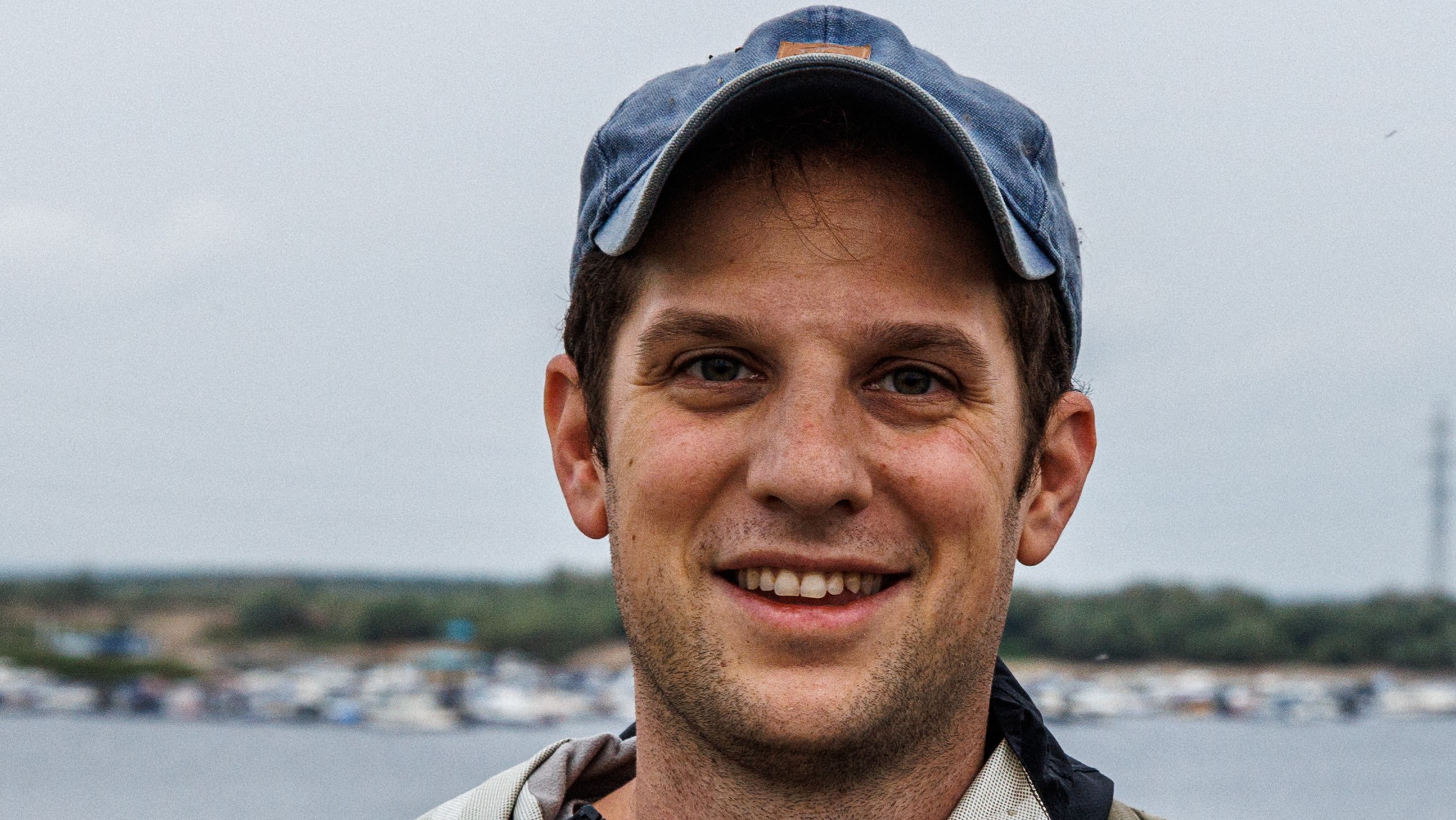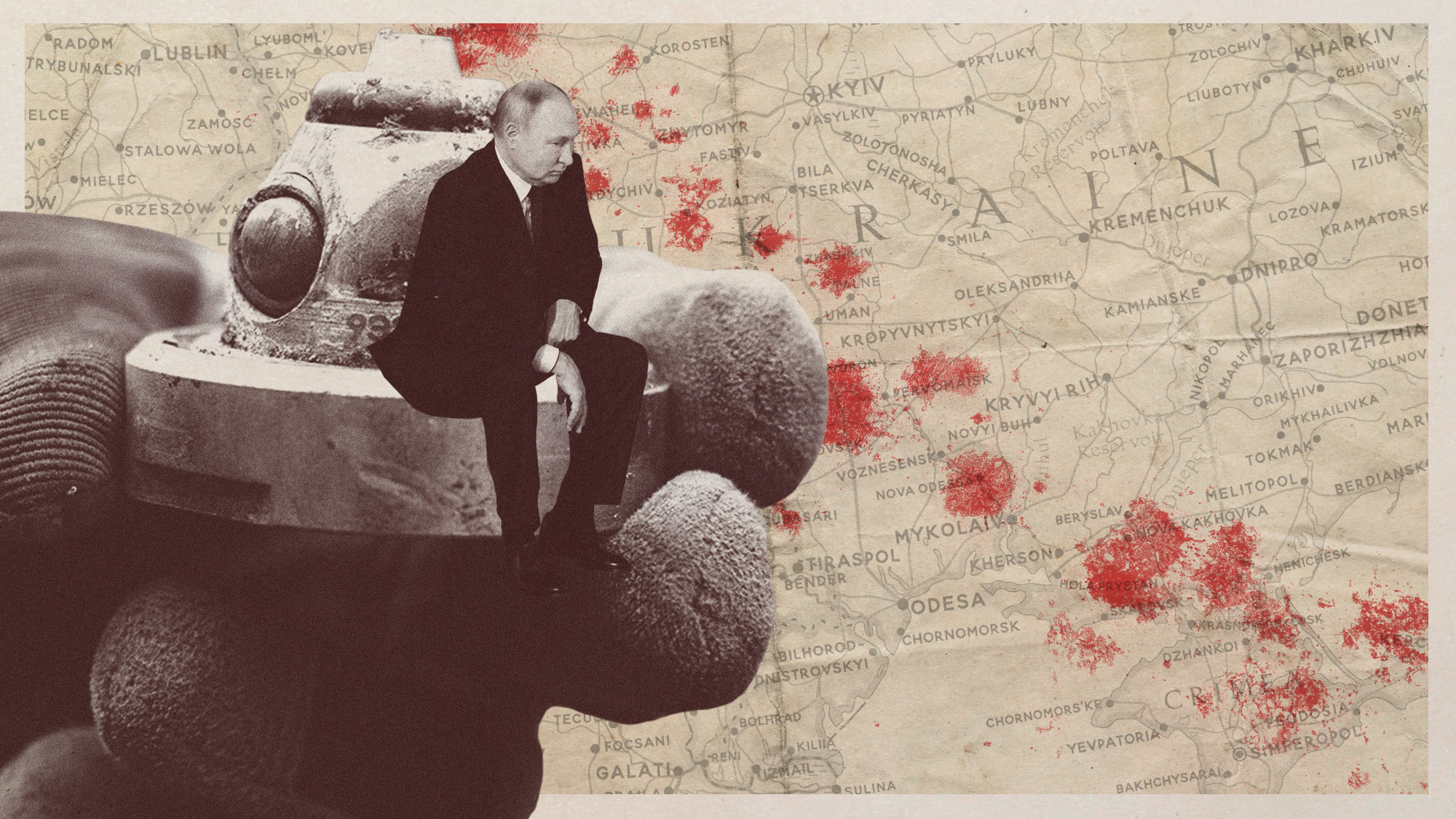Evan Gershkovich: what does Russia want from jailing US citizens?
Russian police arrested Wall Street Journal reporter on espionage charges in first such case since Cold War

A free daily email with the biggest news stories of the day – and the best features from TheWeek.com
You are now subscribed
Your newsletter sign-up was successful
A Wall Street Journal reporter has become the latest US citizen to be detained in Russia but the first overseas journalist to be arrested there for alleged espionage since the Cold War.
The FSB, Russia’s security agency and the main successor to the Soviet-era KGB, has accused Evan Gershkovich of collecting information on “the military-industrial complex, which constitutes a state secret”, said Radio Free Europe’s Russian service. Russia claims to have caught him “red-handed”, the broadcaster added.
Gershkovich, 31, was officially accredited as a journalist by the Russian foreign ministry. He emigrated from Russia to the US with his family when he was a child, and speaks the language fluently. He was working in Yekaterinburg at the time of his detention but it is not known where he is being held.
The Week
Escape your echo chamber. Get the facts behind the news, plus analysis from multiple perspectives.

Sign up for The Week's Free Newsletters
From our morning news briefing to a weekly Good News Newsletter, get the best of The Week delivered directly to your inbox.
From our morning news briefing to a weekly Good News Newsletter, get the best of The Week delivered directly to your inbox.
In what PBS describes as “a rare phone call between the diplomats since the Ukraine war”, US Secretary of State Antony Blinken urged his Russian counterpart, foreign minister Sergey Lavrov, to release Gershkovich immediately – as well as Paul Whelan, another imprisoned American.
One US citizen per year
Since 2017, Russia has detained at least one US citizen per year, according to a report by the James W. Foley Legacy Foundation in September.
Whelan, a security executive and former Marine, was in Moscow in 2018 for a wedding when he was detained on espionage charges. In 2020, he was sentenced to 16 years in a prison labour camp after “a sham trial”, said The Hill. The 53-year-old was moved to a prison hospital last month “for undisclosed reasons”.
Last summer, Blinken and Lavrov discussed a proposal to release Whelan, along with Brittney Griner. Griner, an American professional basketball player and two-time Olympic gold medallist, was detained in February last year when Russian customs officials said they found cartridges containing hashish oil, often used in vape pens, in her luggage.
A free daily email with the biggest news stories of the day – and the best features from TheWeek.com
The 32-year-old was found guilty of attempted drug smuggling and sentenced to nine years in a notorious penal colony, where she was moved in November.

In December, Griner was released in a prisoner swap for Viktor Bout, a Russian arms dealer known as the Merchant of Death who had been serving a 25-year prison sentence. But Whelan was not included in the deal, despite US diplomats’ efforts, said The New York Times.
Her case echoed that of Marc Fogel, a 61-year-old history teacher from Pittsburgh, who was detained in Moscow in 2021 for carrying medical marijuana, which according to The Hill he used to treat chronic back pain. He was sentenced to 14 years at a labour camp for drug trafficking. The US State Department has not yet designated Fogel as “wrongfully detained”.
Sarah Krivanek was also a teacher who had been working at a Russian private school since 2017. After an altercation with her partner in 2021, during which she allegedly wielded a knife in self-defence, she was arrested – despite her boyfriend retracting any charges. In February, when Russia invaded Ukraine, Krivanek, 46, was sentenced at a trial without a jury to a year in a Russian penal colony.
The Californian was released in December, on the same day as Brittney Griner.
Warning or bargaining chip
The Wall Street Journal has accused Russian president Vladimir Putin of detaining Gershkovich to “embarrass the US and intimidate the foreign press still working in Russia. The Kremlin has cowed domestic reporting in Russia, so foreign correspondents are the last independent sources of news.”
The arrest came days after his widely read dispatch documenting the decline of the Russian economy. “The Kremlin doesn’t want that truth told,” said the WSJ.
We do not know yet whether Gershkovich has been taken as an example, a warning or a bargaining chip, but he is likely to face “a lengthy show trial”, said The Washington Post.
Hostage taking is a key component of Putin’s leverage, and Gershkovich “is a hostage until proven otherwise”. In this case, Putin is sending “a very clear message to the international community, and the United States in particular: Journalism in Russia is dead, and foreign correspondents are not welcome.”
But the case is hardly likely to help relations between the former Cold War enemies, especially while the US maintains its support for Ukraine and continues to impose hefty sanctions on Russia. US President Joe Biden told reporters at the White House that Russia should “let him go”.
Harriet Marsden is a senior staff writer and podcast panellist for The Week, covering world news and writing the weekly Global Digest newsletter. Before joining the site in 2023, she was a freelance journalist for seven years, working for The Guardian, The Times and The Independent among others, and regularly appearing on radio shows. In 2021, she was awarded the “journalist-at-large” fellowship by the Local Trust charity, and spent a year travelling independently to some of England’s most deprived areas to write about community activism. She has a master’s in international journalism from City University, and has also worked in Bolivia, Colombia and Spain.
-
 The environmental cost of GLP-1s
The environmental cost of GLP-1sThe explainer Producing the drugs is a dirty process
-
 Greenland’s capital becomes ground zero for the country’s diplomatic straits
Greenland’s capital becomes ground zero for the country’s diplomatic straitsIN THE SPOTLIGHT A flurry of new consular activity in Nuuk shows how important Greenland has become to Europeans’ anxiety about American imperialism
-
 ‘This is something that happens all too often’
‘This is something that happens all too often’Instant Opinion Opinion, comment and editorials of the day
-
 New START: the final US-Russia nuclear treaty about to expire
New START: the final US-Russia nuclear treaty about to expireThe Explainer The last agreement between Washington and Moscow expires within weeks
-
 What would a UK deployment to Ukraine look like?
What would a UK deployment to Ukraine look like?Today's Big Question Security agreement commits British and French forces in event of ceasefire
-
 Trump peace deal: an offer Zelenskyy can’t refuse?
Trump peace deal: an offer Zelenskyy can’t refuse?Today’s Big Question ‘Unpalatable’ US plan may strengthen embattled Ukrainian president at home
-
 Vladimir Putin’s ‘nuclear tsunami’ missile
Vladimir Putin’s ‘nuclear tsunami’ missileThe Explainer Russian president has boasted that there is no way to intercept the new weapon
-
 How should Nato respond to Putin’s incursions?
How should Nato respond to Putin’s incursions?Today’s big question Russia has breached Nato airspace regularly this month, and nations are primed to respond
-
 Russia’s war games and the threat to Nato
Russia’s war games and the threat to NatoIn depth Incursion into Poland and Zapad 2025 exercises seen as a test for Europe
-
 What will bring Vladimir Putin to the negotiating table?
What will bring Vladimir Putin to the negotiating table?Today’s Big Question With diplomatic efforts stalling, the US and EU turn again to sanctions as Russian drone strikes on Poland risk dramatically escalating conflict
-
 Ottawa Treaty: why are Russia's neighbours leaving anti-landmine agreement?
Ottawa Treaty: why are Russia's neighbours leaving anti-landmine agreement?Today's Big Question Ukraine to follow Poland, Finland, Lithuania, Latvia and Estonia as Nato looks to build a new ‘Iron Curtain' of millions of landmines